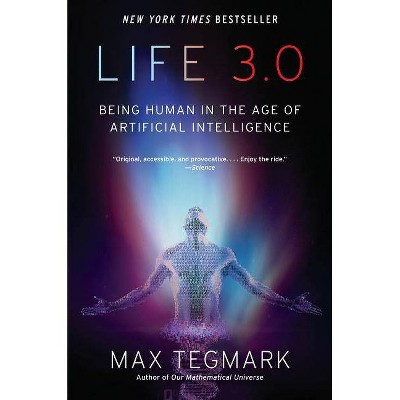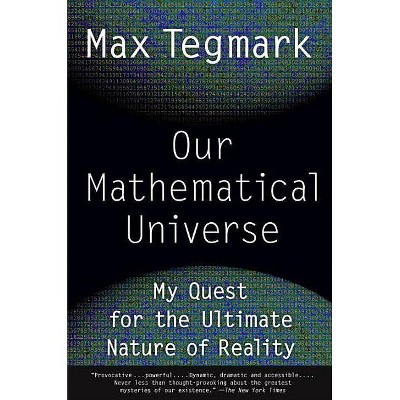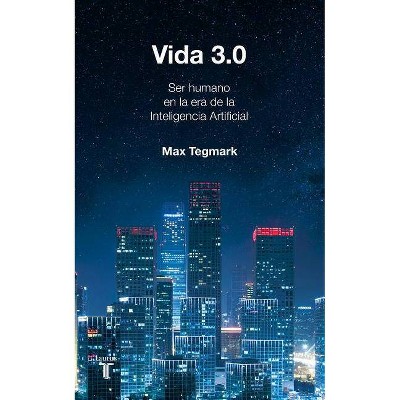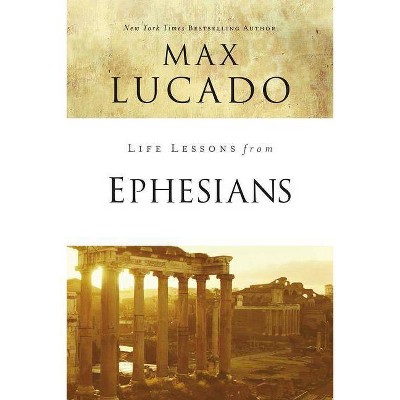Life 3.0 - by Max Tegmark (Paperback)

Similar Products
Products of same category from the store
AllProduct info
<p/><br></br><p><b> About the Book </b></p></br></br>"How will Artificial Intelligence affect crime, war, justice, jobs, society and our very sense of being human? The rise of AI has the potential to transform our future more than any other technology--and there's nobody better qualified or situated to explore that future than Max Tegmark, an MIT professor who's helped mainstream research on how to keep AI beneficial. How can we grow our prosperity through automation without leaving people lacking income or purpose? What career advice should we give today's kids? How can we make future AI systems more robust, so that they do what we want without crashing, malfunctioning or getting hacked? Should we fear an arms race in lethal autonomous weapons? Will machines eventually outsmart us at all tasks, replacing humans on the job market and perhaps altogether? Will AI help life flourish like never before or give us more power than we can handle? What sort of future do you want? This book empowers you to join what may be the most important conversation of our time. It doesn't shy away from the full range of viewpoints or from the most controversial issues--from superintelligence to meaning, consciousness and the ultimate physical limits on life in the cosmos."--Publisher's description.<p/><br></br><p><b> Book Synopsis </b></p></br></br>In this authoritative and eye-opening book, Max Tegmark describes and illuminates the recent, path-breaking advances in Artificial Intelligence and how it is poised to overtake human intelligence. How will AI affect crime, war, justice, jobs, society and our very sense of being human? The rise of AI has the potential to transform our future more than any other technology--and there's nobody better qualified or situated to explore that future than Max Tegmark, an MIT professor who's helped mainstream research on how to keep AI beneficial. <p/> How can we grow our prosperity through automation without leaving people lacking income or purpose? What career advice should we give today's kids? How can we make future AI systems more robust, so that they do what we want without crashing, malfunctioning or getting hacked? Should we fear an arms race in lethal autonomous weapons? Will machines eventually outsmart us at all tasks, replacing humans on the job market and perhaps altogether? Will AI help life flourish like never before or give us more power than we can handle? <p/> What sort of future do <i>you</i> want? This book empowers you to join what may be the most important conversation of our time. It doesn't shy away from the full range of viewpoints or from the most controversial issues--from superintelligence to meaning, consciousness and the ultimate physical limits on life in the cosmos.<p/><br></br><p><b> Review Quotes </b></p></br></br><br>"Anyone who wants to discuss how artificial intelligence is shaping the world should read this book. Tegmark, a physicist by training, takes a scientific approach. He doesn't spend a lot of time saying we should do this or that, and as a result, <i>Life 3.0</i> offers a terrific baseline of knowledge on the subject." --Bill Gates, "10 Favorite Books about Technology" <p/>"Original, accessible, and provocative. . . . Tegmark successfully gives clarity to the many faces of AI, creating a highly readable book that complements <i>The Second Machine Age</i>'s economic perspective on the near-term implications of recent accomplishments in AI and the more detailed analysis of how we might get from where we are today to AGI and even the superhuman AI in <i>Superintelligence. . . .</i> At one point, Tegmark quotes Emerson: 'Life is a journey, not a destination.' The same may be said of the book itself. Enjoy the ride, and you will come out the other end with a greater appreciation of where people might take technology and themselves in the years ahead." --<i>Science <p/></i>"Lucid and engaging, it has much to offer the general reader. Mr. Tegmark's explanation of how electronic circuitry--or a human brain--could produce something as evanescent and immaterial as thought is both elegant and enlightening. But the idea that machine-based superintelligence could somehow run amok is fiercely resisted by many computer scientists. . . . Yet the notion enjoys more credence today than a few years ago, partly thanks to Mr. Tegmark." <i><i>--<i>Wall Street Journal</i> </i><br></i><br>"This is a compelling guide to the challenges and choices in our quest for a great future of life, intelligence and consciousness--on Earth and beyond."<i> </i>--Elon Musk, Founder, CEO and CTO of SpaceX and co-founder and CEO of Tesla Motors <p/>"All of us--not only scientists, industrialists and generals--should ask ourselves what can we do now to improve the chances of reaping the benefits of future AI and avoiding the risks. This is the most important conversation of our time, and Tegmark's thought-provoking book will help you join it." --Professor Stephen Hawking, Director of Research, Cambridge Centre for Theoretical Cosmology <p/>"Tegmark's new book is a deeply thoughtful guide to the most important conversation of our time, about how to create a benevolent future civilization as we merge our biological thinking with an even greater intelligence of our own creation." --"Being an eminent physicist and the leader of the Future of Life Institute has given Max Tegmark a unique vantage point from which to give the reader an inside scoop on the most important issue of our time, in a way that is approachable without being dumbed down." --Jaan Tallinn, co-founder of Skype <p/> "This is an exhilarating book that will change the way we think about AI, intelligence, and the future of humanity." --Bart Selman, Professor of Computer Science, Cornell University<i><br></i><br>"The unprecedented power unleashed by artificial intelligence means the next decade could be humanity's best--or worst. Tegmark has written the most insightful and just plain fun exploration of AI's implications that I've ever read. If you haven't been exposed to Tegmark's joyful mind yet, you're in for a huge treat."<i> </i>--Professor Erik Brynjolfsson, Director of the MIT Initiative on the Digital Economy and co-author of <i>The Second Machine Age</i> <p/>"Tegmark seeks to facilitate a much wider conversation about what kind of future we, as a species, would want to create. Though the topics he covers--AI, cosmology, values, even the nature of conscious experience--can be fairly challenging, he presents them in an unintimidating manner that invites the reader to form her own opinions." --Nick Bostrom, Founder of Oxford's Future of Humanity Institute, author of <i>Superintelligence</i> <p/>"I was riveted by this book. The transformational consequences of AI may soon be upon us--but will they be utopian or catastrophic? The jury is out, but this enlightening, lively and accessible book by a distinguished scientist helps us to assess the odds." --Professor Martin Rees, Astronomer Royal, cosmology pioneer, author of <i>Our Final Hour <p/></i>In [Tegmark's] magnificent brain, each fact or idea appears to slip neatly into its appointed place like another little silver globe in an orrery the size of the universe. There are spaces for Kant, Cold War history and Dostoyevsky, for the behaviour of subatomic particles and the neuroscience of consciousness. . . . Tegmark describes the present, near-future and distant possibilities of AI through a series of highly original thought experiments. . . . Tegmark is not personally wedded to any of these ideas. He asks only that his readers make up their own minds. In the meantime, he has forged a remarkable consensus on the need for AI researchers to work on the mind-bogglingly complex task of building digital chains that are strong and durable enough to hold a superintelligent machine to our bidding. . . . This is a rich and visionary book and everyone should read it. <i><i>--The Times </i>(UK) <p/>"Life 3.0</i> is far from the last word on AI and the future, but it provides a fascinating glimpse of the hard thinking required." --Stuart Russell, <i><i>Nature</i> <p/></i>"Tegmark's book, along with Nick Bostrom's <i>Superintelligence, </i> stands out among the current books about our possible AI futures. . . . Tegmark explains brilliantly many concepts in fields from computing to cosmology, writes with intellectual modesty and subtlety, does the reader the important service of defining his terms clearly, and rightly pays homage to the creative minds of science-fiction writers who were, of course, addressing these kinds of questions more than half a century ago. It's often very funny, too." <i>--The Telegraph </i>(UK) <p/>"Exhilarating. . . . MIT physicist Tegmark surveys advances in artificial intelligence such as self-driving cars and Jeopardy-winning software, but focuses on the looming prospect of 'recursive self-improvement'--AI systems that build smarter versions of themselves at an accelerating pace until their intellects surpass ours. Tegmark's smart, freewheeling discussion leads to fascinating speculations on AI-based civilizations spanning galaxies and eons. . . . Engrossing." --<i>Publishers Weekly</i><br><p/><br></br><p><b> About the Author </b></p></br></br><b>MAX TEGMARK</b> is an MIT professor who has authored more than 200 technical papers on topics from cosmology to artificial intelligence. As president of the Future of Life Institute, he worked with Elon Musk to launch the first-ever grants program for AI safety research. He has been featured in dozens of science documentaries. His passion for ideas, adventure, and entrepreneurship is infectious.
Price History
Price Archive shows prices from various stores, lets you see history and find the cheapest. There is no actual sale on the website. For all support, inquiry and suggestion messagescommunication@pricearchive.us




















